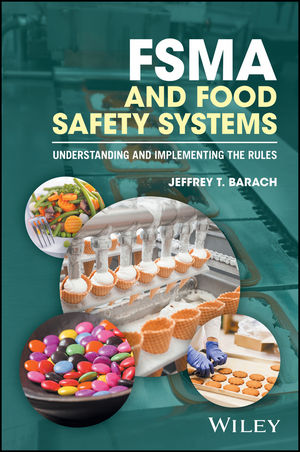Food Defense in the Age of Domestic Terrorism

Historians will likely look at December 2, 2015, as a “game changer.” The news has become all too familiar to the world. Two individuals, a husband and wife in this case, perpetrated another terrorist event by killing 14 people and wounding 21 others who were attending what is reported to have been a holiday party.
The operational competence the perpetrators exhibited in the shooting was immediately characterized as being something different, exhibiting many of the characteristics of careful and extended planning and precision execution. The perpetrators were in and out of the facility quickly and escaped before the first police arrived, although police arrived only minutes after the first shots were fired.
When the “perps” were finally tracked down, a massive gunfight ensued. The end result was, thankfully, no injured police, but two very dead terrorists. The SUV they drove when they fled the attack contained a substantial arsenal of weapons and ammunition, as well as numerous improvised explosive devices (IEDs), some of which were thrown at police during the chase. A subsequent investigation at the apartment of the killers revealed what can only be described as an “IED factory,” in many ways identical to those encountered by the military since 2002 in places like Iraq and Afghanistan. This was indeed a game-changing tragedy.
Amidst the din of media coverage, the press failed to notice two things—and when the press doesn’t notice, the public usually doesn’t either. The implications of these two facts lie squarely at the intersection of food safety and food defense. First, the male suspect, Syed Rizwan Farook, 28, was a 2009 graduate of California State University at San Bernardino, with a degree in environmental health. That in and of itself might be an interesting fact, but it takes on more significance when placed in the larger context of trying to figure out motives and, more importantly, capabilities. These are natural questions to be asked during a police investigation, and these are questions with national security implications.
The second fact missed by many in the press and public is that the San Bernardino County Public Health Department environmental health services division employed Farook as a food facilities inspector. Under local and state codes, this division is responsible for inspecting restaurants, public pools, hotels and motels, body art facilities and rental housing, as well as overseeing community food producers and cottage food operations. Farook routinely spent time working without supervision in the kitchens of restaurants, hotels and motels—the kinds of facilities that serve food to large numbers of people every day. Again, the implications of this can only be appreciated by looking at the facts through the lens of law enforcement and national security.
The question that did emerge almost immediately in the press was whether this tragic event was the work of ISIS (Islamic State). The evidence, much of it cyber-related (smartphones, computers, social media), must be gone through methodically. Here are some facts about ISIS that you might not know. ISIS is currently trying to acquire multiple “tools” they consider game changers. The first and most important desired acquisition is recruits, specifically Americans, who live and work here and who can act as “lone wolves” or in teams of attackers. Farook was an American, reportedly born and educated here. Was he an ISIS recruit? The answer is actually not important, because he acted in the manner that ISIS is trying to promote, therefore enabling ISIS to claim credit—whether or not the claim is true. ISIS is also seeking weapons of mass destruction, including chemical weapons (or industrial chemicals used as such), biological weapons (with which to attack food and water systems), radiological weapons (i.e. “dirty bombs”), and ultimately nuclear weapons.
Most people think countering these threats is the sole responsibility of the government, police and military. They are wrong. Food production and processing systems, restaurants and grocery stores might not be considered on the front line for national defense, but every American eats food and drinks water. ISIS knows this and is trying to acquire weapons that could be delivered through these systems, because using the food system would be a quick way to cause casualties (dead and sick). More important is the devastating mass psychological effect, the front face of “terror.”
Farook had “the keys to the kingdom,” meaning he had inside access to a critical infrastructure. He had the capability and opportunity to do things to food-related facilities, and the products they contained, that could make people sick, perhaps even kill them. Did he do that? That question cannot yet be answered definitively, since we are very early in the investigation. Did he plan to do that at some later time? Again, only time will tell as the investigation matures and more evidence is uncovered.
At this stage, however, there is an even more troubling element. Terrorists rarely operate in a vacuum, meaning they do things people can observe during the various phases of planning, rehearsal and mission execution. Farook is no exception. Neighbors are now reporting all kinds of strange characters and happenings at the Farook household. Reportedly, neighbors observed males of approximately his same age bringing large quantities of materials into the apartment at all hours of the day and night. No one reported these observations to the police out of fear they would be considered “racist.”
A question therefore naturally emerges. Would personnel in food establishments he inspected have acted in the same way, had they observed something suspicious? Would food establishment personnel ever have considered a county health inspector a possible threat?
If they didn’t, they should have. Perhaps this case will cause them to consider more seriously the idea that any person associated with the food establishment, whether an employee (an “insider threat”), a visitor (inspectors, delivery personnel, etc.) or even a customer could pose a serious threat. The world has changed, and the way food establishments operate must change to meet the threats. So what is the owner of a food establishment to do?
Some simple solutions cost little. First, owners of food establishments must know definitively who they employ, and observation is the key to spotting anomalies. Any deviance from normal behavior or actions must be considered in the larger context of security. Any sudden or dramatic change in behavior must be investigated. This is the responsibility of all employees, and leadership should nurture and foster an environment with a “no fault” reporting mechanism. No one should be frightened or intimidated from reporting concerns, out of a fear of being accused of doing so maliciously. In those cases where false accusing does occur, punishment should be swift and public, so as to discourage a repeat. This is good advice in general, not just in the context of terrorism. Insider threats are a huge problem for business, and disgruntled employees have shown themselves on numerous occasions to be fully capable of causing tragedy, both personal and businesswise.
Visitors, whether government officials or delivery personnel, should be escorted at all times, and their movements should be controlled as appropriate to the situation. Even in small facilities, lack of attention to visitors can give them quick access to parts of the business where they do not belong.
Overall surveillance is also important, particularly in those areas of the facility that might be considered “pinch points” (such as hallways and storage rooms) or “concentration points” (such as food production and processing areas and equipment). Cameras or motion detection systems are often used to illuminate potential problem areas. Cameras, unfortunately, are only useful after an event has already occurred. A more robust system utilizes video cameras, with video regularly reviewed for abnormalities. The faster an event is detected, the better. Discovering a terrorist or criminal event in the earliest stages might mean the survival of the business versus its destruction in the wake of tragedy and litigation.
America is at war and therefore must act accordingly. The food production, processing and distribution systems, whether wholesale or retail, are potential targets that must be hardened rapidly or eventually suffer the consequences. Business cannot depend on the government. Brand is everything in this highly competitive economy, and a company not capable of protecting the consumers of its products is a company likely not long for this world.
We as citizens of this great nation are all in this together. We have to pull ourselves together and steel ourselves for the fight. Each of us has a responsibility; if we “see something, say something.” For the sake of our businesses, but more importantly for the sake of our friends and families, we must not let the adversary win.
The friends and families of 35 people are now grieving because of the loss or injury of their loved ones, people who suffered because others saw suspicious behavior and said nothing, out of fear others would see them in a negative manner. Truly this was a tragedy that did not need to be allowed to happen.
Robert A. Norton, Ph.D., is a professor at Auburn University and a member of the Auburn University Food System Institute’s core faculty. A long-time consultant to federal and state law enforcement agencies, the Department of Defense and industry, he specializes in intelligence analysis, weapons of mass destruction defense and national security. For more information on the topic or for more detailed discussions about specific security related needs, he can be reached at nortora@auburn.edu or by phone at 334.844.7562.
Looking for a reprint of this article?
From high-res PDFs to custom plaques, order your copy today!








